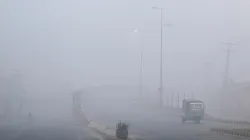Scared of Delhi pollution? AQI of THIS city will take away your breath for a minute
The smog situation in Multan's surrounding districts of Bahawalpur, Muzaffargarh, and Khanewal was also the same, resulting in reduced visibility on roads.

The national capital has been reeling under heavy pollution for the last few days with the AQI crossing 375. Pollution levels in the national capital saw a spike during Chhath Puja on Thursday evening with the Air Quality Index (AQI) recorded at 382 at 6 pm, according to the Central Pollution Control Board. Many concerning reports have come out about cornering the government. Many video also came out where water sprinklers are being used to subside the pollution levels. The Delhi government is going to hire three mist spray drones to combat dust pollution in hotspot areas as well as gather real-time data on major pollutants.
If you are worried about pollution levels in India's national capital, a city's record in the neighbouring nation may compel you to love your country more. On Friday morning, the city of Multan in Pakistan turned apocalyptic as the city crossed the 2000 mark on Air Quality Index reading, as per Dawn. According to Dawn, Multan, the largest city in south Punjab province of Pakistan, recorded an Air Quality Index (AQI) reading of 2,135 between 8am and 9am, according to IQAir, a Swiss air quality monitor. According to AQI classifications in India, a range of 0-50 is considered "good," 51-100 "satisfactory," 101-200 "moderate," 201-300 "poor," 301-400 "very poor," and 401-500 "severe.
The state government of Pakistan's Punjab is on high alert and is implementing various measures to bring down the pollution levels. The state closed parks and museums till November 17 as air quality worsened to record level in all major cities of Punjab.
The concentration of PM2.5 — fine particulate matter in the air that causes the most damage to health — was 947 micrograms per cubic metre, which is 189.4 times above the WHO guideline, as per IQAir. The global health body considers anything over five micrograms per cubic metre as hazardous.
The AQI in Multan reached 980 by 10pm, at least three times over the 300 mark considered "hazardous". Three air quality monitors in the city at the WWF-Pakistan Office, Shamsabad Colony and Multan Cantonment showed AQI readings of 2,316, 1,635 and 1,527, respectively, at 10pm, as per Dawn.
